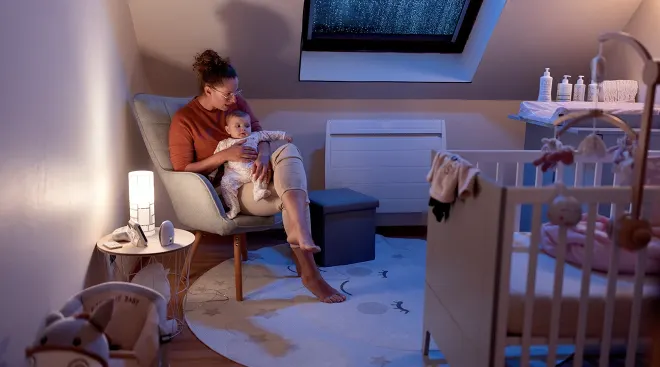How to Get Through Those Exhausting “Split Nights” With Baby
Split nights go a little something like this: It’s 1 a.m., you’re in the thick of a delightful dream, and you’re suddenly jolted awake by a curious sound on the baby monitor. You walk shakily to the nursery to find baby wearing a party hat and blowing a noise maker. Surprise! This isn’t your average middle-of-the-night wake-up—it’s a full-blown bash just for you. And, spoiler alert, it’s going to last two to three hours. Split nights typically involve one lengthy wake-up. It can be both brutal despite how adorably bubbly baby may be. Below, we dive into what causes split nights with baby, plus how to bring these ragers to an end.
Split nights usually involve baby waking up only once in the middle of the night but for an extended period of time—usually one to three hours. “Split nights are more than just the usual middle-of-the-night wake-up,” says Macall Gordon, MA, a pediatric sleep consultant and co-author of the book Why Won’t You Sleep?!: A Game-Changing Approach for Exhausted Parents of Nonstop, Super Alert, Big Feeling Kids. “For regular wake-ups, your go-to strategies will usually work to get the child back to sleep. But a split night is when the child is up and nothing appears to work until they just run out of steam.”
Though split nights can be difficult for obvious reasons, a hallmark of a split night is a happy baby. They’re alert and ready to play. Richard R., dad of eight in Murfreesboro, Tennessee, says, after 18 years of raising many children, he and his wife “have had to learn to expect occasional split nights and even to appreciate the opportunity to be up in the middle of the night with a child who can’t sleep.” Maya W., mom of one in Napa, California, takes the good with the bad: “The next day there’s usually a longer nap, which can be a benefit for us parents, but otherwise, it’s generally pretty rough.”
According to Gordon, “Split nights typically stem from one of two sources: overtiredness or undertiredness.” The trick is figuring out which one you’re dealing with. Though it seems counterintuitive, overtiredness can result in baby having a harder time falling asleep and staying asleep. But undertiredness can be just as trick: “If they’re using too much of their [sleep] quota in the daytime, they won’t have enough left over for the nighttime,” says Gordon.
Natalie Barnett, PhD, a pediatric sleep researcher and vice president of clinical research at Nanit, also suggests that split nights could result from certain sleep habits. She says sometimes they occur when “the child has developed a habit of becoming fully awake in the middle of the night and is dependent on something external to get back to sleep.” She adds that milestones could also be to blame. If nap schedules seem to be on track, it may be worth looking into other physiological reasons. Gordon says that obstructed breathing, food intolerances, and other issues could potentially cause these odd wake-ups.
According to Barnett, “One of the best ways to tackle split nights is to follow an age-appropriate schedule during the day.” In the case of overtiredness, Gordon suggests helping baby catch up on sleep by offering more naptime, however you need to. She also recommends setting baby’s bedtime to be 12 to 13 hours after their morning wake-up. When dealing with undertiredness, she suggests capping naps to be within age-appropriate daytime sleep limits. This will increase their sleep pressure, or accumulated tiredness, and help them get through the night.
For some parents, troubleshooting might also involve trying a sleep training method to help baby learn to settle back to sleep independently. Whatever your approach, ground yourself in the knowledge that this is a phase, and it will pass. While working back to a more functional sleep schedule, lean on your support system.
To get out of the split-night pattern, patience and consistency are key. “Stick to a regular schedule during the day and aim to have your child go to bed at a similar time each night,” advises Barnett. “If you’re making changes in how you respond at night, be consistent for at least a week and know that habits can take time to change.”
If you’ve tried altering daytime sleep and nothing seems to be working, it might be worth checking with a doctor to see if there are any physiological reasons for the extended wakings. Gordon says if all else fails, sometimes what looks like a split night can actually be a symptom. Your pediatrician can help you rule out any underlying issues.
Split nights with baby are a lot of things: challenging, exhausting, sweet and—most importantly—temporary. With time and troubleshooting, you’ll get back to a more functional nighttime schedule in no time.
Please note: The Bump and the materials and information it contains are not intended to, and do not constitute, medical or other health advice or diagnosis and should not be used as such. You should always consult with a qualified physician or health professional about your specific circumstances.
Plus, more from The Bump:
Natalie Barnett, PhD, is a pediatric sleep researcher and vice president of clinical research at Nanit.
Macall Gordon, MA, is a pediatric sleep consultant and co-author of the book Why Won't You Sleep?!: A Game-Changing Approach for Exhausted Parents of Nonstop, Super Alert, Big Feeling Kids.
Learn how we ensure the accuracy of our content through our editorial and medical review process.
Navigate forward to interact with the calendar and select a date. Press the question mark key to get the keyboard shortcuts for changing dates.




















































